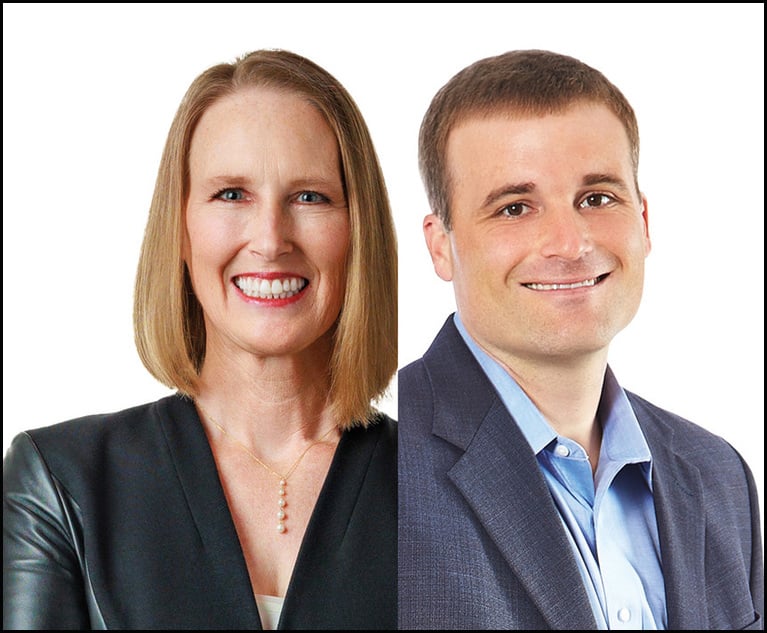Law Firm Softball Game Injury Not Work-Related, Judge Rules
Morris James does not have to pay a paralegal's workers' compensation claims for an injury he suffered while rounding the bases during a softball game played by firm employees, a Delaware Superior Court judge has ruled.
April 03, 2018 at 05:04 PM
3 minute read
The original version of this story was published on Delaware Law Weekly

Morris James does not have to pay a paralegal's workers' compensation claims for an injury he suffered while rounding the bases during a softball game played by firm employees, a Delaware Superior Court judge has ruled.
After nearly three years of litigation, Judge Ferris W. Wharton said last week that William Weller, a paralegal for Morris James' bankruptcy practice, was not entitled to the benefits because he had ruptured his Achilles tendon outside the scope of his employment with one of Delaware's best-known law firms.
The ruling reversed an earlier finding by the state Industrial Accident Board that participation on the team was an employment-related activity that benefited the firm by boosting employee productivity. Wharton, however, said that the board's decision “misconstrues” settled law and essentially “makes up” a new factor for deciding whether employers are required to pay the benefits.
In a 23-page opinion, Wharton said that Morris James derived no direct benefit from Weller's involvement with the team, which plays in the Wilmington Lawyers League.
“Such enhanced productivity is a consequence of the increased morale, c[a]maraderie and health of the employees resulting from participating on the softball team and is the very type of benefit this court admonished the board to disregard,” Wharton wrote March 29.
“Morris James is a law firm; its goal is to bring in legal business. Morris James does not advertise its legal services at games, its clientele does not attend or participate at games, and softball has no beneficial monetary impact on the firm.”
Weller, who has been with the firm since 2002, convinced the board last year that Morris James brought softball into the orbit of employment at the firm by paying for equipment and signing liability agreements so the team could practice in the area. He had also pointed to testimony from other employees at the firm who said they felt pressured to play in the games.
The board found in its ruling that the involvement of several of the Morris James' vendors could have resulted in cost savings on services provided to the firm.
But Wharton said that employee participation was voluntary, and there was no evidence that playing on the team was a job requirement. Wharton also blasted as “entirely conjecture” the board's conclusion that vendor involvement had resulted in a direct benefit for the firm.
“Conjecture is not evidence,” Wharton wrote. “[The board] does not provide even a mere scintilla of evidence to support the conclusion, nor would a reasonable mind accept it as adequate.”
Weller did not respond to a call requesting comment on the case, and Morris James did not provide comment for this story.
Attorneys for Weller and the firm were not immediately available to comment on Tuesday.
Weller was represented by Gary S. Nitsche and William R. Stewart of Weik, Nitsche & Dougherty.
Morris James was represented by Scott R. Mondell and Elissa A. Greenberg of Elzufon Austin & Mondell.
The case, on appeal to the Superior Court, was captioned Morris James v. Weller.
This content has been archived. It is available through our partners, LexisNexis® and Bloomberg Law.
To view this content, please continue to their sites.
Not a Lexis Subscriber?
Subscribe Now
Not a Bloomberg Law Subscriber?
Subscribe Now
NOT FOR REPRINT
© 2025 ALM Global, LLC, All Rights Reserved. Request academic re-use from www.copyright.com. All other uses, submit a request to [email protected]. For more information visit Asset & Logo Licensing.
You Might Like
View All


3rd Circ Orders SEC to Explain ‘How and When the Federal Securities Laws Apply to Digital Assets’
5 minute read
Womble Bond Dickinson's Wilmington Office Sees New Leadership as Merger Is Completed
4 minute readTrending Stories
- 1Paul Hastings, Recruiting From Davis Polk, Continues Finance Practice Build
- 2Chancery: Common Stock Worthless in 'Jacobson v. Akademos' and Transaction Was Entirely Fair
- 3'We Neither Like Nor Dislike the Fifth Circuit'
- 4Local Boutique Expands Significantly, Hiring Litigator Who Won $63M Verdict Against City of Miami Commissioner
- 5Senior Associates' Billing Rates See The Biggest Jump
Who Got The Work
J. Brugh Lower of Gibbons has entered an appearance for industrial equipment supplier Devco Corporation in a pending trademark infringement lawsuit. The suit, accusing the defendant of selling knock-off Graco products, was filed Dec. 18 in New Jersey District Court by Rivkin Radler on behalf of Graco Inc. and Graco Minnesota. The case, assigned to U.S. District Judge Zahid N. Quraishi, is 3:24-cv-11294, Graco Inc. et al v. Devco Corporation.
Who Got The Work
Rebecca Maller-Stein and Kent A. Yalowitz of Arnold & Porter Kaye Scholer have entered their appearances for Hanaco Venture Capital and its executives, Lior Prosor and David Frankel, in a pending securities lawsuit. The action, filed on Dec. 24 in New York Southern District Court by Zell, Aron & Co. on behalf of Goldeneye Advisors, accuses the defendants of negligently and fraudulently managing the plaintiff's $1 million investment. The case, assigned to U.S. District Judge Vernon S. Broderick, is 1:24-cv-09918, Goldeneye Advisors, LLC v. Hanaco Venture Capital, Ltd. et al.
Who Got The Work
Attorneys from A&O Shearman has stepped in as defense counsel for Toronto-Dominion Bank and other defendants in a pending securities class action. The suit, filed Dec. 11 in New York Southern District Court by Bleichmar Fonti & Auld, accuses the defendants of concealing the bank's 'pervasive' deficiencies in regards to its compliance with the Bank Secrecy Act and the quality of its anti-money laundering controls. The case, assigned to U.S. District Judge Arun Subramanian, is 1:24-cv-09445, Gonzalez v. The Toronto-Dominion Bank et al.
Who Got The Work
Crown Castle International, a Pennsylvania company providing shared communications infrastructure, has turned to Luke D. Wolf of Gordon Rees Scully Mansukhani to fend off a pending breach-of-contract lawsuit. The court action, filed Nov. 25 in Michigan Eastern District Court by Hooper Hathaway PC on behalf of The Town Residences LLC, accuses Crown Castle of failing to transfer approximately $30,000 in utility payments from T-Mobile in breach of a roof-top lease and assignment agreement. The case, assigned to U.S. District Judge Susan K. Declercq, is 2:24-cv-13131, The Town Residences LLC v. T-Mobile US, Inc. et al.
Who Got The Work
Wilfred P. Coronato and Daniel M. Schwartz of McCarter & English have stepped in as defense counsel to Electrolux Home Products Inc. in a pending product liability lawsuit. The court action, filed Nov. 26 in New York Eastern District Court by Poulos Lopiccolo PC and Nagel Rice LLP on behalf of David Stern, alleges that the defendant's refrigerators’ drawers and shelving repeatedly break and fall apart within months after purchase. The case, assigned to U.S. District Judge Joan M. Azrack, is 2:24-cv-08204, Stern v. Electrolux Home Products, Inc.
Featured Firms
Law Offices of Gary Martin Hays & Associates, P.C.
(470) 294-1674
Law Offices of Mark E. Salomone
(857) 444-6468
Smith & Hassler
(713) 739-1250






